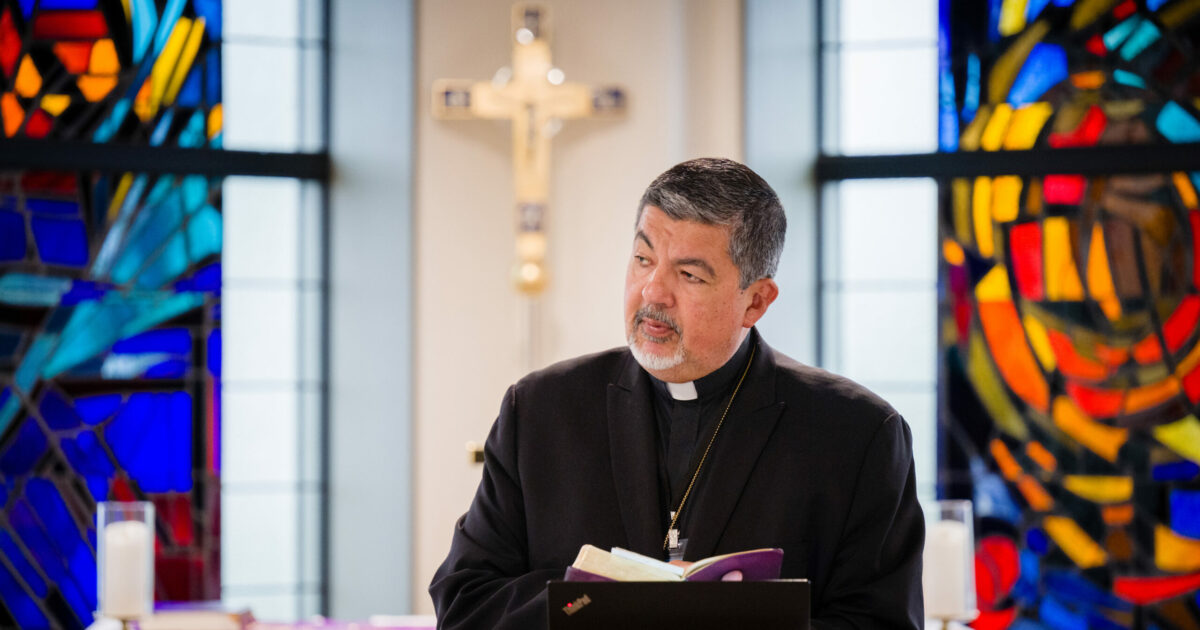
By Sarah Hjulberg
Church workers, laity and college students gathered March 14–15 at the Spectrum Campus of Concordia University Irvine (CUI), Irvine, Calif., for the “Mercy: Love Throughout Life” conference, hosted by The Lutheran Church—Missouri Synod (LCMS) Office of National Mission (ONM). The event was one of two in-person locations for the conference, with others attending in St. Louis as well as online.
The presentations in California focused on marriage, life and the family.
In his opening remarks, the Rev. Dr. Alfonso Espinosa, pastor of St. Paul’s Lutheran Church in Irvine, Calif., said, “It’s necessary to teach and equip [on marriage] because of all that stands against God and His kingdom — namely our sin, the world and the devil. These are the sources of darkness that seek to cover us in despair so that our marriages, our lives and our families would crumble.” Espinosa also serves as chairman of the LCMS Board for National Mission.
“But through the light of our Lord Jesus Christ,” Espinosa continued, “the darkness is overcome so that in Christ our marriages, our lives and our families may be blessed and prosper in accord with His good pleasure.”
‘Glorious and beautiful’ truth
“How do you talk about life issues with gentleness and respect to people who don’t understand those things?” was one question Shane Perry, a CUI senior in the pre-seminary program, brought to the conference.
Several sessions addressed this question directly.
In his presentation, Espinosa pointed to the examples of St. Peter and St. Paul to guide our approach to “celebrating male and female without denigrating and demonizing people in the culture.” St. Peter gave testimony with gentleness and respect (1 Peter 3:15); St. Paul, in Acts, “found the common ground” and treated the Athenians not as enemies, but as friends.
Espinosa continued by arguing that even though the culture’s attacks on marriage and family are egregious, Christians should not get defensive, or “behave as if our battle is against flesh and blood,” as St. Paul warns in Ephesians 6:12. Rather, Christians can “emphasize the truth in all its glory, and in all its beauty, backed up with the conviction that not only are we not ashamed of the truth, but that we also relish it, we rejoice in it, because it is indeed glorious and beautiful.”
Recalling the Rev. Brian Barlow’s talk earlier that day on “The Gift of the Other,” Espinosa emphasized that “complementarity … brings a joy we could never muster on our own. Marriage breaks us out of ourselves. It demonstrates how much we learn to rely on the gift of the other.”
Pointing to marriage as a picture of what God intends for His creatures — a beautiful, true and glorious picture — is a far better witness than entering a power struggle with the culture, Espinosa concluded.
Nurturing healthy families
Professors from CUI’s Townsend Institute for Leadership and Counseling provided several sessions that were practical in nature. Dr. Ashlie Andrew, director of organizational leadership, discussed communication in marriage; Michelle Thompson, senior director of external relations, talked about ways to nurture and deepen all relationships; and Dr. Margaret Christmas Thomas, dean of the Townsend Institute, presented on nurturing healthy families.
Thomas outlined some keys to healthy families — no matter the stage — according to the fruits of the spirit (Gal. 5:22–23). For instance, strong communication, active listening, encouraging openness and respect, and resolving conflicts in families should, above all, be marked by kindness. Or, as children grow, what constitutes a healthy boundary may change as they become more independent. Mutual respect for one another, marked especially by patience, makes for a healthy family.
‘A compelling moral vision’
Finally, the conference also included several sessions on the theology of life, marriage and the family, given by CUI theology professors — the Rev. Dr. David Loy, the Rev. Dr. Steven Mueller and the Rev. Dr. Scott Stiegemeyer.
In Loy’s presentation,“‘We Cherish Life’: Presenting a Compelling Moral Vision,” he argued that in addition to condemning actions that break the Fifth Commandment — such as abortion or stem cell research that requires the death of an embryo — the cherishing of life ultimately flows from our redemption in Jesus Christ.
“We strive to care for each of these vulnerable persons because [they] provide us with an opportunity to reflect God’s love and mercy into this world. We cherish each of these vulnerable persons because God cherishes us in Christ, and because God cherishes them in Christ. This, I believe, is a compelling moral vision.”
“God the Son took on our human nature, and He went through the entire life cycle of a simple human being, from zygote to blastocyst to a healthy adult, and then to death. And if He did that, all without sin on His part, He did this for each and every sinful human being at whatever stage of development, and His blood redeems each and every one of us,” Loy concluded.
One conference, many locations
At the same time attendees in Irvine were considering topics of marriage, life and the family, their counterparts in St. Louis heard presentations on mercy work and advocating and caring for life.
Speakers included LCMS President Rev. Dr. Matthew C. Harrison; LCMS Wyoming District President Rev. John Hill; the Rev. Andy Becker, ONM manager of family discipleship; Deaconess Emily McClain, who serves at the Lutheran Haven in Oviedo, Fla.; and the Rev. Dr. Leonard Payton, pastor of St. John Lutheran Church, Forest Park, Ill., among many others. The conference also offered an online Spanish track, with presentations on marriage and the family given by professors from Concordia the Reformer Seminary in Santiago, Dominican Republic.
Posted May 22, 2025




